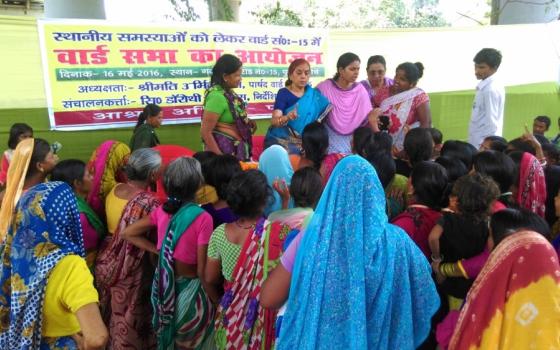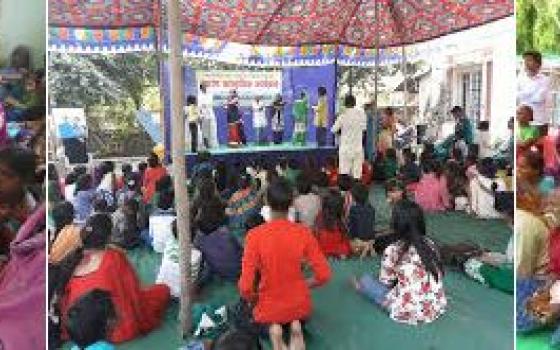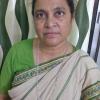"Those who possess a vision of life must commit themselves to Journeying,
always a little further, always one pace beyond."
– Presentation of the Blessed Virgin Mary Sr. Raphael Consedine
Responding to an invitation in 1997 to teach at a Regional Pastoral Center in the state of Bihar, India, opened my eyes to the extreme deprivation of the people residing there. Teaching social justice and women's empowerment provided me with an opportunity to mingle with rural women and children. Illiteracy was high, and walking through rural villages outside of the capital city Patna inspired me to begin 25 informal centers to provide deprived children a taste of education. Through this entry point, women and youth groups were formed in four of the local village governance bodies. After an evaluation of the learning centers, we concentrated on one village, Islamganj. There was not a single educated person in this fisher workers community, but by 2010 we had a small two-story school building for the primary education of the Islamganj children.
In 2004, I realized that in order to intervene I would have to raise the local issues from the rural to the district level. My passion for the people living with few economic resources in urban areas drew me to Patna. What I witnessed disturbed me: the quality of life of the poor, the lack of basic amenities — and in the capital of the state! When I visited government departments, I found that they had no concept or understanding of a slum. Realizing that we would have to have some legal standing to make a difference, I formed a registered organization with a small group of local young people. The government set up a housing program for the urban poor in Patna, and we began to visit homeless communities of people living along the roadside and near drains. We educated them about their rights and the benefits of organizing, and we taught them how to raise their voices against the injustices they were suffering.
We gathered people together every month to oppose evictions and to organize sit-in protests, conventions, rallies and fasts. We held press conferences and interfaced with the media to draw the government's attention. Soon construction workers, small vendors, rickshaw pullers and leprosy patients contacted us. As our weapon of intervention, we adopted a rights-based approach — the right to shelter, food and livelihood (all enshrined in the national constitution, Article 21-A). When groups joined the programs, they were prepared to strike a day's work to fight for their rights, so we had to provide them with services. We also set up learning centers for the urban poor of the unorganized sector, showing them how to benefit from government programs and training. This strategy of ensuring entitlements to our people has reaped a rich harvest. It is a new form of evangelization, acknowledged as such by the archbishop of Patna.
It is against this background that the presence of Presentation Sisters makes sense and becomes the driving force to become love poured out to a people who seek an identity. What makes me do this and make this happen? There has to be a reason, a desire beyond myself. The realization of how much I have received and how blessed I am has made me redefine for myself my purpose for being here. The answer lies in the fact that I have passionately fallen in love with the person of Jesus. With this as the premise of my life then nothing is impossible, nothing is difficult.
My moments of quiet, gazing on the face of Jesus and contemplating the cross, make me realize that now it's my turn to change the course of history in this mission field. I draw inspiration from how Jesus walked this earth; I believe that this is what Nano Nagle, the founder of our Presentation Sisters, would want me to be and do. That inner voice compels me to get out of bed and to go find life waiting for me — women in the slums or skills centers; children in the learning centers; the vendors on the streets; the construction workers; the elderly.
This is the eucharistic table to which Jesus invites me every day. It is from here I am invited to become the compassionate face of Jesus, to listen to their stories (which is the Word), and then to give them what they most long for — a smile and a search for solutions through dialogue.
Another eucharistic table is discipleship with my community, the few with a deep sense of commitment who have chosen to give their all. We join hands to spread Nano's work among the people on the periphery. We interact daily because our discipleship calls for regular sharing, even disagreement, but we never lose sight of our goal. This is where synergy is generated; this is where we become inclusive — all having a say, all having a voice.
The eucharistic table beyond this is a movement of other people called to become salt and leaven. Our alliances with the diocesan social service center give us a chance to share our gifts, to provide leadership to the archdiocesan women's commission, to reflect with inter- congregational groups on what we women can offer to our church and on issues of gender equality as we sit as women and men together to look at the life of our archdiocese. And with the Forum of Religious for Justice and Peace as the core, we search for ways to be relevant, prophetic and radical. We strive to hold the balance of contemplation and action, and we re-read Scriptures in the light of today's reality.
But I am still aware of the human weakness within me. My moments of quiet invite me to become aware of my need for healing and forgiveness. Aware of my nothingness, I bow in humble adoration before the God who dwells in me, and I recognize the God in every person I will encounter this day. I am aware that "the Almighty chooses His weakest instrument to do great things…"(Nano Nagle). In this awareness I grow in the consciousness that the table is for all, and that I must become inclusive in my being and approach.
Living alone these 20 years, I have had my own challenges, but I was never lonely, forming communities among people, restoring human dignity, and laying the eucharistic table wherever I went. And spending time each day to communicate with the one who continues to call has compelled me to listen to that inner voice. I trust that this is God's work; I continue my search believing that the light will come only one step at a time.
And so the journey continues, sometimes uphill, sometime on smooth terrain. Rocks and thorns will be part of any journey, but I have a deep belief that the Almighty will never let me down. At every turn of the journey I can feel her presence within me, around me. So, I walk along — knowing that when I am tired and weak, unable to take the next step, I will be carried.
[Dorothy Fernandes a Sister of the Presentation of the Blessed Virgin Mary from India. She presently serves as Vice Provincial of the Indian province while continuing to be deeply engaged with the urban poor of Patna, Bihar.]


